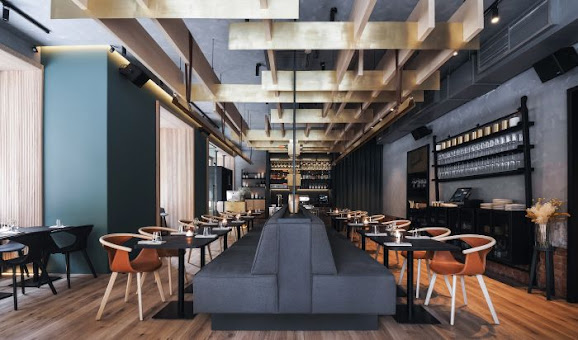How to design a blended workspace?
Workspaces have moved away from the traditional, matrix-like cubicle scenario. Cubicles are replaced by workspaces that are open and functional to encourage collaboration and interaction among the employees. Known as the blended workspace, these spaces are modular in nature but with many adaptable elements to them. A blended workspace has an open design that allows you to see where who is sitting, what they are working on... Blended workspace design also effectively ends the hierarchical seating that is inherent in a traditional workspace. You might just find your boss sitting right next to you and an HR executive might probably be using a cabin for privacy and interviews. Most corporate office interior design companies in Dubai have great insights into how to design a blended workspace and here is what they have to say.
A blended workspace is typically split into different zones -
Active Space
These are good old tables of different shapes and sizes. When the activity demands that the team sits together, long rectangle tables can be put together while smaller teams can use oval-shaped. The beauty of this design is in its fluidity. If the team deems that they can work better if they are seated near a window, they can literally move to just about any active space without having to shift anything else other than their laptops. Wireless technology definitely has its uses. Minimal usage of paper has also reduced the need for cabinets and drawers. Today, most use an office cabinet only to store laptops, adaptors, and electronic accessories. This has helped Corporate Interior Design Companies to plan the office floor with more space and ergonomic furniture that would increase the comfort factor for the employees.
Breakout Spaces
One of the many things that have changed in today's office space design is the need for breakout spaces. Stress at work is shaping the way for many Corporate Interior Design Companies to design breakout spaces that would help relax the employees, improve engagement, interaction and put the fun back in the work. These can be typically a Table Tennis space, a pool table, foosball... etc. Some even have funky slides, themed spaces with bars, library look with rugs and books. The idea is to make the space look different from the active spaces so that employees get to relax, leave their work behind in a zone, and not get stressed. Companies like Google go all out to provide their employees with awesome breakout spaces with a camping theme or a mini cafeteria. Some even have a slide to help the employees discover the child within them!
Breakout spaces are essential in today's workspace design. They help break the monotony of work and it also helps the employees to think out of the box.
Privacy Pods
Not all work can happen as a team effort. Some work needs to be done in seclusion. An all-out open design can become disruptive and noise levels distracting. Privacy pods are a great solution for this problem. The design of the pods also plays a huge role in providing psychological comfort and focus to the people and it's been known to hugely boost productivity levels. Pods are usually designed for a single employee and some of the best corporate office interior design brings in a theme of a spaceship or an old-fashioned payphone to give the employees a whole new experience.
Lounges
While breakout spaces are mostly situated away from the active workspace, lounges are kept right within the active area. The idea is to provide the employee's space to just sit down, read, check messages or even work on their laptops. Most times, it also becomes an unofficial brainstorming area or a place to just pick someone's brains.
Client Zones
These are again, areas within the active space where clients can be met informally to talk shop. Most often, this is incorporated in the office design to provide the client with a view of how their company works, the culture, and its work dynamics.
Quiet Zone
While some companies offer privacy pods, most prefer to provide their employees with an entire zone that is quiet. For one thing, this can be one big room partitioned with soundproof glass. If designing a room is difficult, providing a cocooned cubicle area with an alcove design would be perfect. The design should inspire the employees to keep the sound levels low and must promote an automatic understanding that those within it desire privacy and quiet.
Collaboration Zones
Collaboration zones are smaller conference rooms. Today, the traditional conference room that once used to seat a minimum of 40 people has reduced drastically to a minimum of ten people. Smaller collaboration zones are much sought after because teams are becoming smaller as days go by. Collaboration zones can be a glass-encased zone where an entire team can huddle around on a sofa or on chairs with a round table around. Designing these collaboration zones can be thematic in nature in relation to the overall theme of the office interior design.
Designing activity spaces for work is a challenging prospect for Corporate Interior Design Companies because space needs to boost engagement, productivity, and creativity of the employees and provide pleasant avenues to work from. Good workspace interior design dubai can basically make or break the company, therefore it becomes imperative to hire the best in this industry.

Thank you for the info! Want to know which Interior Design Companies in Dubai? Balcon Studio is recognized for their ability to blend modern and classic elements in their designs. They are definitely worth considering.
ReplyDelete